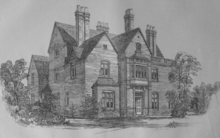Robert Watson Willis
Robert Watson Willis [1] (born London 26 July 1843; died 16 January 1892) was a British sportsman. He served as the second secretary of the Football Association from 1866 to 1867, succeeding Ebenezer Morley.[2] He also served on the FA's committee from 1867 to 1872.[2]
Like Morley, Willis was a member of Barnes Football Club, and took part in the historic London v. Sheffield match of 1866.[3] He served as secretary to the Barnes Club from 1864 to 1867, and as captain of the club from 1867 to 1870.[4][5][6] Morley described him as "a warm admirer of the game and an excellent footballer".[7]
Willis was also a keen oarsman, competing in a pair with fellow footballer Robert Graham, who succeeded him as FA secretary in 1867.[8].
Career
Willis worked in the wine import industry, with a special interest in Spain. He became a partner of Peter Domecq and Co., a sherry importer, in 1872.[9] He later became a founding director of the Union Bank of Spain and England.[10] Willis retired from the business in 1890.[11]
Family

Willis was the son of eminent Scottish physician Robert Willis. He married Helen Graham, elder sister of his colleague and teammate Robert Graham, on 28 August 1867.[12] The family later lived in Hinxton House, East Sheen, whose name reflected the village of Hinxton, Cambridgeshire, where Helen spent her childhood. The house was built for the family shortly before 1877.[13]
Willis died in 1892, at the age of 48. He was survived by his wife Helen and five children.
Notes
- "Football Association". The Sporting Life. London: 1. 3 February 1867.
- n.a. [Geoffrey Green] (1953). History of the Football Association. London: Naldrett Press. pp. 82–84.
- "London v Sheffield". Bell's Life in London: 7. 24 March 1886.
- "Barnes Football Club Athletic Sports". Bell's Life in London: 10. 1 April 1865.
- "Barnes Football Club". Bell's Life in London: 8. 24 April 1866.
- "Barnes Football Club". Sporting Life: 3. 9 March 1867.
- "The Football Association". Bell's Life in London (2288): 7. 24 February 1866.
- "Champion Pairs". Morning Advertiser: 3. 22 July 1867.
- "Changes in Mercantile Firms for the New Year". Money Market Review. London. xxiv (625): 8. 6 January 1872.
- "Union Bank of Spain and England". The Bankers' Magazine. London. liii: 616. 1892.
- "[no title]" (PDF). London Gazette: 2081. 14 April 1891.
- "Cambridge: Married". Bury and Norwich Post: 6. 3 September 1867.
- "Hinxton House, East Sheen, Surrey". The Architect. London. xviii: 46. 28 July 1877.: see also illustration of the house on p. 48.